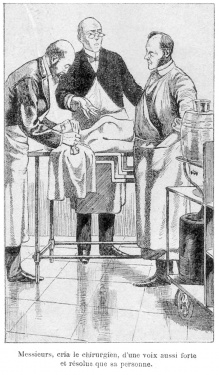His First Operation
His First Operation is a short story written by Arthur Conan Doyle first published collected in Round the Red Lamp on 23 october 1894 by Methuen & Co., and the same year in USA by D. Appleton & Co..
Editions
- in Round the Red Lamp (1894-1930)
- in Mémoires d'un médecin (1906, Félix Juven [FR]) as La Première opération
- in La Première opération (1906, Société d'Édition et de Publications Collection Rouge No. 20 [FR]), 1 ill. by Martin Van Maële
- in Maîtresse Royale (july 1907, Félix Juven Le Roman romanesque No. 51 [FR] ) as La Première opération
- in Le Petit Parisien Supplément Littéraire Illustré (1 november 1908 [FR]) as La Première opération
- in L'Horrible agonie de Lady Sannox (ca. 1920-1923, L'Édition Française Illustrée [FR]) as Sa première opération
- in Tales of Adventure and Medical Life (27 july 1922, John Murray's Fiction Library [UK])
- in The Man from Archangel and Other Tales of Adventure (autumn 1925, George H. Doran Co. [US])
Illustrations
- Illustrations by Martin Van Maële (Société d'Édition et de Publications, 1906)
-
"Gentlemen," cried the surgeon in a voice as hard and brisk as his manner.
His First Operation
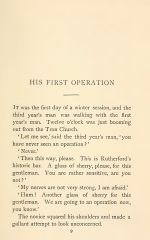
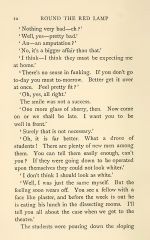
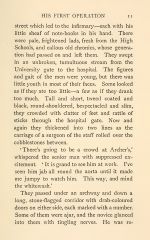

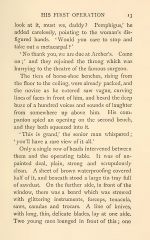
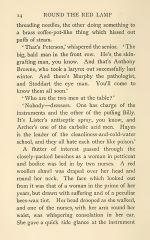



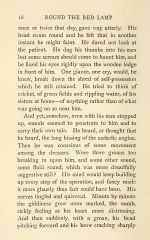

It was the first day of the winter session, and the third year's man was walking with the first year's man. Twelve o'clock was just booming out from the Tron Church.
"Let me see," said the third year's man. "You have never seen an operation?"
"Never."
"Then this way, please. This is Rutherford's historic bar. A glass of sherry, please, for this gentleman. You are rather sensitive, are you not?"
"My nerves are not very strong, I am afraid."
"Hum! Another glass of sherry for this gentleman. We are going to an operation now, you know."
The novice squared his shoulders and made a gallant attempt to look unconcerned.
"Nothing very bad — eh?"
"Well, yes — pretty bad."
"An — an amputation?"
"No; it's a bigger affair than that."
"I think — I think they must be expecting me at home."
"There's no sense in funking. If you don't go to-day, you must to-morrow. Better get it over at once. Feel pretty fit?"
"Oh, yes; all right!" The smile was not a success.
"One more glass of sherry, then. Now come on or we shall be late. I want you to be well in front."
"Surely that is not necessary."
"Oh, it is far better! What a drove of students! There are plenty of new men among them. You can tell them easily enough, can't you? If they were going down to be operated upon themselves, they could not look whiter."
"I don't think I should look as white."
"Well, I was just the same myself. But the feeling soon wears off. You see a fellow with a face like plaster, and before the week is out he is eating his lunch in the dissecting rooms. I'll tell you all about the case when we get to the theatre."
The students were pouring down the sloping street which led to the infirmary — each with his little sheaf of note-books in his hand. There were pale, frightened lads, fresh from the high schools, and callous old chronics, whose generation had passed on and left them. They swept in an unbroken, tumultuous stream from the university gate to the hospital. The figures and gait of the men were young, but there was little youth in most of their faces. Some looked as if they ate too little — a few as if they drank too much. Tall and short, tweed-coated and black, round-shouldered, bespectacled, and slim, they crowded with clatter of feet and rattle of sticks through the hospital gate. Now and again they thickened into two lines, as the carriage of a surgeon of the staff rolled over the cobblestones between.
"There's going to be a crowd at Archer's," whispered the senior man with suppressed excitement. "It is grand to see him at work. I've seen him jab all round the aorta until it made me jumpy to watch him. This way, and mind the whitewash."
They passed under an archway and down a long, stone-flagged corridor, with drab-coloured doors on either side, each marked with a number. Some of them were ajar, and the novice glanced into them with tingling nerves. He was reassured to catch a glimpse of cheery fires, lines of white-counterpaned beds, and a profusion of coloured texts upon the wall. The corridor opened upon a small hall, with a fringe of poorly clad people seated all round upon benches. A young man, with a pair of scissors stuck like a flower in his buttonhole and a note-book in his hand, was passing from one to the other, whispering and writing.
"Anything good?" asked the third year's man.
"You should have been here yesterday," said the out-patient clerk, glancing up. "We had a regular field day. A popliteal aneurism, a Colles' fracture, a spina bifida, a tropical abscess, and an elephantiasis. How's that for a single haul?"
"I'm sorry I missed it. But they'll come again, I suppose. What's up with the old gentleman?"
A broken workman was sitting in the shadow, rocking himself slowly to and fro, and groaning. A woman beside him was trying to console him, patting his shoulder with a hand which was spotted over with curious little white blisters.
"It's a fine carbuncle," said the clerk, with the air of a connoisseur who describes his orchids to one who can appreciate them. "It's on his back and the passage is draughty, so we must not look at it, must we, daddy? Pemphigus," he added carelessly, pointing to the woman's disfigured hands. "Would you care to stop and take out a metacarpal?"
"No, thank you. We are due at Archer's. Come on!" and they rejoined the throng which was hurrying to the theatre of the famous surgeon.
The tiers of horseshoe benches rising from the floor to the ceiling were already packed, and the novice as he entered saw vague curving lines of faces in front of him, and heard the deep buzz of a hundred voices, and sounds of laughter from somewhere up above him. His companion spied an opening on the second bench, and they both squeezed into it.
"This is grand!" the senior man whispered. "You'll have a rare view of it all."
Only a single row of heads intervened between them and the operating table. It was of unpainted deal, plain, strong, and scrupulously clean. A sheet of brown water-proofing covered half of it, and beneath stood a large tin tray full of sawdust. On the further side, in front of the window, there was a board which was strewed with glittering instruments — forceps, tenacula, saws, canulas, and trocars. A line of knives, with long, thin, delicate blades, lay at one side. Two young men lounged in front of this, one threading needles, the other doing something to a brass coffee-pot-like thing which hissed out puffs of steam.
"That's Peterson," whispered the senior, "the big, bald man in the front row. He's the skin-grafting man, you know. And that's Anthony Browne, who took a larynx out successfully last winter. And there's Murphy, the pathologist, and Stoddart, the eye-man. You'll come to know them all soon."
"Who are the two men at the table?"
"Nobody — dressers. One has charge of the instruments and the other of the puffing Billy. It's Lister's antiseptic spray, you know, and Archer's one of the carbolic-acid men. Hayes is the leader of the cleanliness-and-cold-water school, and they all hate each other like poison."
A flutter of interest passed through the closely packed benches as a woman in petticoat and bodice was led in by two nurses. A red woolen shawl was draped over her head and round her neck. The face which looked out from it was that of a woman in the prime of her years, but drawn with suffering, and of a peculiar beeswax tint. Her head drooped as she walked, and one of the nurses, with her arm round her waist, was whispering consolation in her ear. She gave a quick side-glance at the instrument table as she passed, but the nurses turned her away from it.
"What ails her?" asked the novice.
"Cancer of the parotid. It's the devil of a case; extends right away back behind the carotids. There's hardly a man but Archer would dare to follow it. Ah, here he is himself!"
As he spoke, a small, brisk, iron-grey man came striding into the room, rubbing his hands together as he walked. He had a clean-shaven face, of the naval officer type, with large, bright eyes, and a firm, straight mouth. Behind him came his big house-surgeon, with his gleaming pince-nez, and a trail of dressers, who grouped themselves into the corners of the room.
"Gentlemen," cried the surgeon in a voice as hard and brisk as his manner, "we have here an interesting case of tumour of the parotid, originally cartilaginous but now assuming malignant characteristics, and therefore requiring excision. On to the table, nurse! Thank you! Chloroform, clerk! Thank you! You can take the shawl off, nurse."
The woman lay back upon the water-proofed pillow, and her murderous tumour lay revealed. In itself it was a pretty thing — ivory white, with a mesh of blue veins, and curving gently from jaw to chest. But the lean, yellow face and the stringy throat were in horrible contrast with the plumpness and sleekness of this monstrous growth. The surgeon placed a hand on each side of it and pressed it slowly backwards and forwards.
"Adherent at one place, gentlemen," he cried. "The growth involves the carotids and jugulars, and passes behind the ramus of the jaw, whither we must be prepared to follow it. It is impossible to say how deep our dissection may carry us. Carbolic tray. Thank you! Dressings of carbolic gauze, if you please! Push the chloroform, Mr. Johnson. Have the small saw ready in case it is necessary to remove the jaw."
The patient was moaning gently under the towel which had been placed over her face. She tried to raise her arms and to draw up her knees, but two dressers restrained her. The heavy air was full of the penetrating smells of carbolic acid and of chloroform. A muffled cry came from under the towel, and then a snatch of a song, sung in a high, quavering, monotonous voice:
- "He says, says he,
- If you fly with me
- You'll be mistress of the ice-cream van.
- You'll be mistress of the—"
It mumbled off into a drone and stopped. The surgeon came across, still rubbing his hands, and spoke to an elderly man in front of the novice.
"Narrow squeak for the Government," he said.
"Oh, ten is enough."
"They won't have ten long. They'd do better to resign before they are driven to it."
"Oh, I should fight it out."
"What's the use. They can't get past the committee even if they got a vote in the House. I was talking to—"
"Patient's ready, sir," said the dresser.
"Talking to McDonald — but I'll tell you about it presently." He walked back to the patient, who was breathing in long, heavy gasps. "I propose," said he, passing his hand over the tumour in an almost caressing fashion, "to make a free incision over the posterior border, and to take another forward at right angles to the lower end of it. Might I trouble you for a medium knife, Mr. Johnson?"
The novice, with eyes which were dilating with horror, saw the surgeon pick up the long, gleaming knife, dip it into a tin basin, and balance it in his fingers as an artist might his brush. Then he saw him pinch up the skin above the tumour with his left hand. At the sight his nerves, which had already been tried once or twice that day, gave way utterly. His head swain round, and he felt that in another instant he might faint. He dared not look at the patient. He dug his thumbs into his ears lest some scream should come to haunt him, and he fixed his eyes rigidly upon the wooden ledge in front of him. One glance, one cry, would, he knew, break down the shred of self-possession which he still retained. He tried to think of cricket, of green fields and rippling water, of his sisters at home — of anything rather than of what was going on so near him.
And yet somehow, even with his ears stopped up, sounds seemed to penetrate to him and to carry their own tale. He heard, or thought that he heard, the long hissing of the carbolic engine. Then he was conscious of some movement among the dressers. Were there groans, too, breaking in upon him, and some other sound, some fluid sound, which was more dreadfully suggestive still? His mind would keep building up every step of the operation, and fancy made it more ghastly than fact could have been. His nerves tingled and quivered. Minute by minute the giddiness grew more marked, the numb, sickly feeling at his heart more distressing. And then suddenly, with a groan, his head pitching forward, and his brow cracking sharply upon the narrow wooden shelf in front of him, he lay in a dead faint.
When he came to himself, he was lying in the empty theatre, with his collar and shirt undone. The third year's man was dabbing a wet sponge over his face, and a couple of grinning dressers were looking on.
"All right," cried the novice, sitting up and rubbing his eyes. "I'm sorry to have made an ass of myself."
"Well, so I should think," said his companion.
"What on earth did you faint about?"
"I couldn't help it. It was that operation."
"What operation?"
"Why, that cancer."
There was a pause, and then the three students burst out laughing. "Why, you juggins!" cried the senior man, "there never was an operation at all! They found the patient didn't stand the chloroform well, and so the whole thing was off. Archer has been giving us one of his racy lectures, and you fainted just in the middle of his favourite story."
